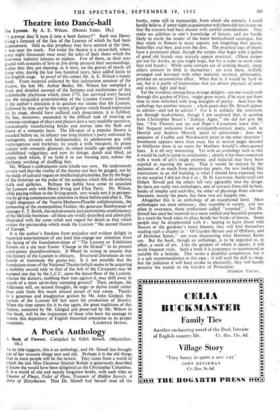Theatre into Dan&-hall
The Lyceum. By A. E. Wilson. (Dennis Yates. 18s.) "I SUPPOSE they'll turn it into a boot factory!" Such was Henry Irving's forecast of the fate of the Lyceum of which he had been dispossessed. Odd as this prophecy may have seemed at the time, it was near the mark. For today the theatre is a dance-hall, where every night thousands wear away the soles of their shoes which the foot-wear industry labours to replace. Few of' them, as their eyes glazed with ecstasies of love or jive dimly perceive their surroundings, realise that they pre dancing, as it were, on the graves of nearly all those who, durn% the last two hundred years, have added lustre to the English stage. In proof of this comes Mr. A. E. Wilson's timely book. From material collected by that industrious amateur of the theatre, the late Mr. Arthur Beales, Mr. Wilson has compiled a lively and detailed account of the fortunes and misfortunes of this indomitable playhouse which, since 1771, has survived every hazard but the misguided-proprietorship of the London County Council. If the author's intention is to quicken our shame that the Lyceum, hallowed by time and by the variety of genius which found expression on its stage, should have suffered such desecration, it is fulfilled. He has, moreover, succeeded in the difficult task of weaving an immense catalogue of plays and players into a very readable narrative, miraculously transforming bricks and mortar into the flesh and blood of a romantic hero. The life-span of a popular theatre is paraded before us; its infancy one long children's party enlivened by menageries, circuses and harlequinades; its adolescence gay with extravaganzas and burlettas; its youth a trifle misspent; its prime radiant with romantic glamour; its robust middle age splendid with uninhibited vulgarities; and now its dotage, dumb and blind, an empty shell which, if we hold it to our burning ears, echoes the rhythmic swishing of shuffling feet. Mr. Wilson's enthusiasms soon kindle our own. He understands so very well that the vitality of the theatre cp best be gauged, not by the study of cultural vogues or intellectual preciosities, but by the finger of the historian on the pulse of the audience which fills its orchestra stalls and galleries. Perhaps the public have come to associate the Lyceum only with Henry Irving and Ellen Terry. Mr. Wilson, while paying tribute to the Irving epoch, very wisely sets it in perspec- tive by giving commensurate attention to those before and after it. The bright elegances of the Vestris-Mathews,Planche collaborations, the pioneering of the cosmopolitan Fechter, the generous flamboyance of manager E. T. Smith, the melodramatic and pantomimic confectionery of the Melville brethren—all these are vividly described and admirably illustrated with the same relish and regard for detail as that which evokes the partnership which made the Lyceum "the second theatre of Europe."
It is the author's freedom from prejudice and evident delight in theatrical entertainment of any kind that engage our attention from the laying of the foundation-stone of "The Lyceum or Exhibition Rooms on a site near Exeter 'Change in the Strand" to its present catch-penny disembowelment. It Ilbuld be wrong to assume that this history of the Lyceum is obituary. Structural alterations do not banish or transmute the genius loci. Is it not possible that the foundation-stone of the National Theatre (which seems to be acquiring a mobility second only to that of the Ark of the Covenant) may be dumped one day by the L.C.C. upon the dance;floor of the Lyceum, whence the dancers, stubbing their toes against it, may drift away in search of a more up-to-date stamping ground? Then, perhaps, the Aldermen will, on second thoughts, be eager to derive credit rather than cash from this much abused parcel of real estate. Thanks to a generous and imaginative gesture by Mr. John Gielgud, the curtain of the Lyceum fell last upon his production of Hamlet. When the time comes for it to rise again, the great traditions of this theatre, sustained by Mr. Gielgud and preserved by Mr. Wilson in this book, will be the inspiration of those who have the courage to restore this depository of English theatrical enterprise to its proper


































 Previous page
Previous page